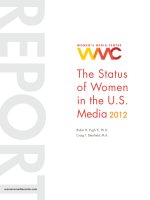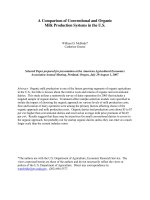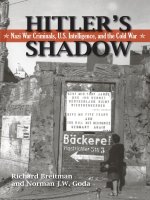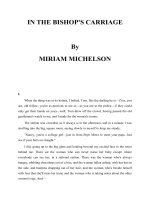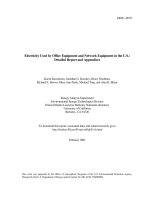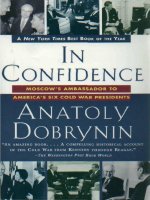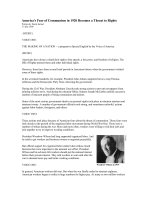in confidence moscow's ambassador to america's six cold war presidents
Bạn đang xem bản rút gọn của tài liệu. Xem và tải ngay bản đầy đủ của tài liệu tại đây (5.01 MB, 697 trang )
IN
CONFIDENCEANATOLY DOBRYNIN
IN
CONFIDENCE
MOSCOW'S AMBASSADOR
TO AMERICA'S SIX
COLD WAR PRESIDENTS
( 1962-1986)
TIMES
RANDOM
BOOKS
HOUSE
With love to my wife Irina,
who shared it all and made this book possible
Copyright © 1995 by Anatoly Dobrynin
All rights reserved under International and Pan-American
Copyright Conventions. Published in the United States by
Times Books, a division of Random House, Inc., New York, and
simultaneously in Canada by Random House of Canada Limited, Toronto.
This work was originally published in hardcover by Times Books, a division
of Random House, Inc., in 1995.
LIBRARY OF CONGRESS CATALOGING-IN-PUBLICATION DATA
Dobrynin, Anatoliy Federovich
In confidence : Moscow's ambassador to America's six Cold War
presidents / by Anatoly Dobrynin.—1st ed.
p. cm.
Includes index.
ISBN 0-8129-2894-6
1. Dobrynin, Anatoliy Fedorovich, 1919— . 2. Ambassadors—
Soviet Union—Biography. 3. United States—Foreign relations—
Soviet Union. 4. Soviet Union—Foreign relations—United States.
5. United States—Foreign relations—20th century. 6. Soviet Union—
Foreign relations—1953—1975. 7. Soviet Union—Foreign relations—
1975-1985. I. Title.
DK275.D63A3 1995
327.2'092—dc20
[B] 95-11611
Designed by Beth Tondreau Design I Robin Bentz
Random House website address: />Printed in the United States of America on acid-free paper
98765432
First Edition
CONTENTS
ACKNOWLEDGMENTS XV
INTRODUCTION 3
BEFORE WASHINGTON
I. My Diplomatic Career Begins 13
From Engineering to Diplomacy 13
Diplomacy from Litvinov: Table Manners from Princess Volkonsky 16
My Apprenticeship at the Ministry 19
II. My First Look at the United States 25
Learning the Diplomatic Ropes 25
Across the Country with Molotov 28
Back to Moscow as Molotovs Assistant 31
A Tour at the United Nations 33
III. Summits: The View from the Other Side of the Peak 37
The Geneva, Summit: Eisenhower and Khrushchev 37
The Collapse of the Paris Summit 40
Khrushchev and Kennedy at Vienna 43
Surprise: I Am Appointed Ambassador to the United States 47
WASHINGTON
THE KENNEDY PRESIDENCY, 1961-1963 53
I. Finding My Way Around Washington 53
Instructions from Moscow 53
The Confidential Channel 54
An Ambassador's Life 57
Meeting President Kennedy and the Washington Establishment 60
The Diplomatic Stalemate over Germany and Berlin 65
Cuba Looms 71
vi • CONTENTS
II. The Cuban Crisis 74
Khrushchev
Offers
Nuclear Missiles
to
Cuba:
Castro
Accepts
74
Soviet Embassies Are Left Out of the Loop 77
The Crisis Erupts: In the Center of the Settlement 81
A Timely Question and Answer Break the Deadlock 89
After the Crisis: Lessons and Footnotes 94
III. Learning to Live Together 100
Setting Up the "Hot Line" 100
The Old Problems Reappear 102
Negotiations on the Nuclear Test Ban 103
My Last Meeting with John E Kennedy 109
President Kennedys Assassination 111
The Kennedy Era Reconsidered 114
THE JOHNSON PRESIDENCY, 1963-1969 119
I. Getting to Know the New President 119
Johnson's Foreign Policy 119
My First Meeting Alone with Johnson 123
Life as a Soviet Diplomat 126
II. Moscow and Vietnam 132
A Palace Coup in Moscow 132
Johnson's Triumphant Election 137
Brezhnev versus Kosygin. Vietnam Escalates 138
The War Party in Washington 141
Our Own Vietnam Syndrome 144
III. Trying to Juggle Peace and War 146
Johnson Stakes His Presidency on Ending the War 146
Moscow's Concern about Vietnam 148
Mixed Results in Disarmament 151
McNamara, Nuclear Strategy, and the ABM 156
IV. Soviet Policy Seeks a Steady Course 160
Kosygin Tries to Mediate in Vietnam 160
The Politburo Outlines the Basis of Soviet Foreign Policy 161
The Six-Day War 163
The Glassboro Summit 167
CONTENTS • vii
V. The Fall of Lyndon Johnson 173
Vietnam Becomes "Johnson's War" 173
The Resignation Gambit Fails 173
Humphrey Declines Moscow's Secret Offer to Help His Election 179
Johnson Seeks a Summit to the Bitter End: It Dies in Prague 182
The Invasion of Czechoslovakia 183
Johnson Presses for a Summit to the Bitter End 189
THE NIXON PRESIDENCY, 1969-1974 196
I. Richard Nixon and Henry Kissinger 196
Soviet-American Relations in the 1970s 196
Enter Nixon and Kissinger 201
Negotiating with the Nixon Administration 206
'Washington and Moscow in 1970: A Year of Drift and Doubt 211
II. Summit Foothills 214
Gromyko and Andropov Want to Drive a Hard Bargain 214
SALT, ABM, and the Summit 216
Maneuvering Toward the Summit: China in the Wings 221
III. A Geopolitical Triangle 231
Enter China 231
Nixon Opens a Dialogue with Brezhnev 233
Pre-Summit Maneuvers 238
War Between India and Pakistan 240
IV. To the Summit 244
Kissinger and I Start Work on the Summit 244
Tripartite Diplomacy 245
Vietnam and the Summit 248
The Summit in Moscow 256
Basking in Detente 262
Moscow, Washington, and the End of the Vietnam War 265
V. To the Summit Again, in America 270
Detente and Its Problems 270
Jewish Emigration and the Coalition Against Detente 271
Nixon Reshapes His Government 275
Brezhnev Makes Kissinger "Sign for It" 278
Brezhnev in America 281
Aftermath of the Summit 289
vlii • CONTENTS
VI. The October War 292
Moscow, Washington, and the Middle East 292
The War Begins 294
Kissinger's Maneuvers 297
A New Crisis 299
The Superpower Stakes Rise: A U.S. Combat Alert Is Declared 302
The End of the War: Nixon Becomes Apologetic 303
VII. The Fall of Richard Nixon 307
Nixon's Last Friend 307
Rumblings in the White House 310
Summit Preparations Again 313
Watergate, the White House, and the Kremlin 315
The Last Summit 317
Nixon's Last Days 320
THE FORD PRESIDENCY, 1974-1977 324
I. Searching for the Real Gerald Ford 324
Starting Out with the New President 324
My Dinner with Nelson Rockefeller: The Middle East 328
My Granddaughter and Ford Divide the Globe 330
On to Vladivostok with Ford 332
Jewish Emigration and Detente 339
Ford versus Nixon 344
II. The Erosion of Detente 347
Thunder on the Right 347
The Fall of Saigon 348
The Helsinki Conference and Its Aftermath 350
The Difficult Road to the Summit 352
Intelligence Wars 357
III. How Appeasing the Right Helped Ford Lose the Presidency 365
Angola 365
Turmoil in the White House over Detente 370
Henry Kissinger's Swan Song 372
Ford versus Carter, as Moscow Saw Them 375
Ford Loses the Election 377
CONTENTS • 1 x
THE CARTER PRESIDENCY, 1977-1981 379
I. The Contradictions of Jimmy Carter 379
Jimmy Who? 379
Friendly First Soundings 381
Carter's New Team 385
Face to Face with Carter 388
The Carter Crusade 391
SALT and Human Rights 393
Moscow Stands Firm 395
The Price for Trying Too Much 397
Trying to Pick Up the Pieces 399
Sounding Out a Summit 402
II. Carter's Muddled Priorities 407
Hung Up on the Horn of Africa 407
Confusion Grows about Detente: Cooperation or Confrontation? 413
Downhill into Deadlock 417
III. The Summit with Carter 420
Reviving the Arms Race 420
Carter Pushes for a Summit 422
The Ascent to Vienna 424
The Summit in Vienna 427
Down from the Summit into the SALT Marshes 432
The Cuban Mini-Crisis 433
Europe as an Arena of Confrontation 434
IV. Afghanistan 439
The Background of Intervention 439
The Die Is Cast 442
Afghanistan and Soviet-American Relations 448
Diplomacy and Presidential Emotion 454
V. Carter's Defeat: An Epitaph for Detente 461
Deadlock on the Eve of the Elections 461
Courting Moscow Before the Election 463
Carter's Defeat 471
VI. The Dismantling of Detente 473
x • CONTENTS
THE REAGAN PRESIDENCY, 1981-1989 483
I. The Paradox of Ronald Reagan 483
The Cold War Returns 483
A Break with the Past 486
Brezhnev Tries a Breakthrough and Fails 494
Reagan Writes to Brezhnev from the Hospital 497
Moscow's Annoyance Mounts 501
II. The Reagan Crusade 505
Impervious to Diplomacy 505
At the White House 509
Haig Is Replaced by the Sphinx 512
Brezhnev and Andropov 517
III. "More Deeds, Less Words" 523
A Personal Discussion, with Reagan, at Last 523
Did the Soviet Union Fear an American Nuclear Attack? 528
The Evil Empire and Star Wars, the Elections, and the Summit 532
Diplomatic Oxymoron 538
The KAL007 Incident: Bitter Memories 541
Andropov: Illusions Dispelled 546
IV. The Thaw 550
How Reagan's Belligerence Backfired 550
Reagan as Peace-monger? 552
Transition: Andropov Dies; Chernenko Succeeds Him 556
Gromyko Returns to the White House 561
A New Atmosphere in Outer (and Inner) Space 564
V. The Beginning of the End of the Cold War 570
What the Geneva Summit Meant 570
Washington Decides to Do Business with Gorbachev 571
Gorbachev Addresses Soviet Foreign Policy 576
The Turn Begins 580
A Frustrating Climb Toward the Summit 583
The Geneva Summit 592
VI. Good-bye to Washington 600
Goodwill and Diplomacy 600
My Life Changes 606
CONTENTS • xi
A Round of Farewells 608
Ronald Reagan and Soviet-American Relations 611
AFTER WASHINGTON
I. Gorbachev: The First and Last President of the Soviet Union 621
Life as a Secretary 621
The International Department 625
The Summit at Reykjavik 626
Gorbachev in a Hurry 629
Gorbachev, Bush, and Germany 633
Instead of an Epilogue 646
APPENDIX 649
INDEX 653
ACKNOWLEDGMENTS
I
am deeply indebted to all those who gave me the wonderful opportu-
nity to work in the diplomatic service for half a century and thus
opened to me the exciting world of diplomacy and international rela-
tions which are the focus of this book. I am grateful for the cooperation
and friendship of my colleagues in the Foreign Ministry of the Soviet Union
and of the Russian Federation.
I also acknowledge with gratitude the support for this book from the
Harriman Institute of Columbia University in New York and the Kennan
Institute of the Woodrow Wilson Center for Scholars in Washington. The
support and warm interest of my friends Dwayne Andreas and Donald
Kendall also helped make this book possible.
In the process of organizing the material and reflecting on it through
successive drafts to produce a book, I want especially to acknowledge the
help of the writer and journalist Lawrence Malkin. His immediate and per-
sistent enthusiasm was seasoned with demanding critiques, and he gave me a
lift that was deeply appreciated. Peter Osnos, my publisher, was invaluable in
shepherding this book through its birth and bringing it to life. Both mixed
support with wise comment about the book's structure, helping to enliven it
and make it more accessible to the reader. They were joined by Don
Oberdorfer, from whose expert and thoughtful reading of the manuscript we
all benefited. I am also grateful to Irina Balakina, for her diligent help to me
in putting the book into English. Peter Smith of Times Books ably partici-
pated in editing the book and Venka Macintyre was the copyreader. All made
the publication of this book a pleasure, and I am deeply grateful to everyone
at Times Books.
My sincere thanks are also due to William Hyland and Robert Levgold
for deep and useful comments and suggestions, and to my literary agent
Morton Janklow, always a wise counselor.
IN
CONFIDENCE
INTRODUCTION
My life and work as a diplomat spanned a unique and decisive period in
the history of my country and the world. We know it as the Cold War. My
career in the Soviet Diplomatic Service began at the end of World War II,
when I had just graduated from Diplomatic School in Moscow and entered
the Foreign Ministry. It continued from the time of Joseph Stalin through to
the downfall of Mikhail Gorbachev in the Soviet Union, and in the United
States from the presidency of Harry S. Truman to that of George Bush.
Altogether my association with Soviet diplomacy lasted almost half a cen-
tury, and about half of that time I served as the ambassador of the Union of
Soviet Socialist Republics to the United States. I participated in preparations
for all the summit meetings; between the leaders of the United States and the
Soviet Union from the first one in Geneva in 1955 until the summit between
Bush and Gorbachev in 1990, the only diplomat to witness all these land-
marks in international relations. My term as ambassador in Washington
began in 1962 and lasted until 1986, the longest term in such a position in
Soviet and indeed the whole of Russian diplomatic history before the
Revolution. The best years of my life were devoted to this work.
During this quarter-century relations between our two countries re-
mained highly unstable. They usually improved after summit meetings and
deteriorated during periods of crisis in various parts of the world. The arms
race far outpaced the disarmament negotiations that were designed to con-
trol it. Local conflicts erupted. It so happened that the task of maintaining
confidential contact at the highest levels between both governments fell pri-
marily on me as the Soviet ambassador in Washington. I saw my fundamen-
tal task as one of helping to develop a correct and constructive dialogue
between the leaders of both countries and maintaining the positive aspects of
our relations whenever possible. I did my best to resist the impulsive emo-
tions caused by diplomatic reverses, misunderstandings, and failures of pol-
icy, of which I witnessed plenty.
In writing this book I have not just relied on my memory. I have con-
sulted the Soviet diplomatic archives in Moscow as well as my own diaries,
4 • INTRODUCTION
none of which has ever been published before. My most important formal
meetings and private conversations with presidents, secretaries of state, na-
tional security advisers, senators, and political and public figures in the
United States have found their way into these pages, as well as many of my
dealings with my superiors and our leaders in Moscow, including the meet-
ings of the Politburo that I attended. 1 have concentrated on matters in
which I personally participated.
I have tried to reflect the spirit of those times and the evolution of
Soviet-American relations in a way that I believe is unique because doors
were open to me in both the White House and the Kremlin. In addition to
the recollections of my early career in the Soviet Foreign Ministry, the
United Nations, and the embassy in Washington, the eyewitness accounts
here span six American presidencies, from John F. Kennedy to Ronald
Reagan. I met with all of them many times. I also knew Presidents Truman,
Eisenhower, and Bush. All these leaders were quite different in their tem-
perament and in their knowledge and ability to deal with affairs of state.
Some were outstanding public figures who remain vivid in my memory, and
each was, without doubt, a notable personality.
In my own country, I closely observed Nikita Khrushchev and Leonid
Brezhnev during their years in power, as well as their successors through
Mikhail Gorbachev, who brought me back to Moscow in 1986 to serve first
as party secretary in charge of international affairs and then as an adviser on
American affairs. I then retired. On August 1, 1991, I returned to the Soviet
Foreign Ministry, which later became the Foreign Ministry of the Russian
Federation, where as of this writing in 1995, I serve as a consultant.
I hope this memoir will be of use to all those who are interested in the
complex history of Soviet-American relations and at the same time serve as a
warning against any recurrence of the sad mistakes of this century. I also
mean it to be a personal history of how affairs of state were conducted by the
White House and the Kremlin.
My American interlocutors still wonder whether I was a true believer in
the Soviet system, and indeed Ronald Reagan was not quite sure whether I
really was a communist (I was). The fact is that I served my country to the
best of my ability as citizen, patriot, and diplomat. I tried to serve what I saw
as its practical and historic interests and not any abstract philosophical no-
tion of communism. I accepted the Soviet system with its flaws and successes
as a historic step in the long history of my country, in whose great destiny I
still believe. If I had any grand purpose in life, it was the integration of my
country into the family of nations as a respected and equal partner. But for
this it is always necessary to consider the realities of the world and one's own
country.
INTRODUCTION • 5
In my everyday activity as ambassador I reported to the Politburo in
general and of course directly to Andrei Gromyko, often exploring openings
in a way that he as foreign minister could not. I was closely connected with a
whole gallery of secretaries of state and national security advisers, among
them Dean Rusk, William Rogers, Henry Kissinger, Cyrus Vance, Edmund
Muskie, Zbignew Brzezinski, Alexander Haig, George Shultz, and Brent
Scowcroft. We saw many conflicts emerge and saw them resolved, but not
without strained negotiations, claims and counterclaims, and emotional de-
bates. But through all this we managed as a rule to maintain good, business-
like relations and in some cases were even on close and friendly terms. I
think of most of my American partners with warm feelings, and I still keep
in touch with some of them.
I also recall with affection and deep gratitude my embassy colleagues—
many of whom later served as ambassadors or in senior diplomatic posts of
the Russian Federation—Yuli Vorontsov, Aleksandr Bessmertnykh, Georgi
Kornienko, George Mamedov, Vladlen Vasev, Oleg Sokolov, Vitaly Churkin,
Victor Komplektov, Victor Isakov, and many others with whom I shared our
difficult tasks during my long term in Washington.
We all strived always t:o keep open the lines of communication to the
other side, although our success varied, depending on the state of relations.
They alternated from dangerous, during the Cuban missile crisis; to more
constructive, during the period of detente under Richard Nixon and Henry
Kissinger; to uncertain and confused, during the Ford and Carter adminis-
trations; to positively frigid after the invasion of Afghanistan and during the
Reagan arms buildup. Despite all this I luckily found myself useful in the
command posts of both sides in the Cold War. In Washington I was granted
access that others found astonishing for the ambassador of the Soviet Union.
By our own government in Moscow I was given rather unprecedented lati-
tude, although I must say one reason was that I myself often decided to take
it, and it evidently suited my superiors for me to do so.
Another principal purpose of this memoir has been to discover the pat-
tern of my career by retracing it for myself as well as my readers. One of its
lessons is how profoundly human nature and indeed human relations affect
the outcome of events; diplomacy, after all, is not just a public and profes-
sional skill but also a very private and individual one.
I believe that one reason for my success in communicating with most
people was that we were prepared to deal with each other on an equal basis to
search for better understanding. I liked communicating with them as well,
and I showed it; this is essential. I dealt with them as human beings, what-
ever our political and philosophical differences—and believe me, they were
profound. Nevertheless I was curious about their motives, and I never failed
6 • INTRODUCTION
to show that I could be sympathetic to their ideas when we found areas of
mutual interest.
On a professional level, it never crossed my mind that I should be ex-
cessively cautious in action or expression, although I always tried to be pru-
dent. As a result of all this, the Kremlin came to rely on my judgment, while
not always accepting it by any means. To both sides, I tried to be a reassuring
presence in a very strained world.
Yet in going through this book readers may wonder how so many peo-
ple in and out of government were persuaded to talk frankly to the represen-
tative of the government that was, after all, the principal adversary of the
United States in the world. There was no great secret to it; building a close
personal relationship was a matter of character, mutual respect, professional-
ism, and good human relations in general. A bit of humor helps, too. But
above all, many of those who spoke to me sincerely wanted better relations
with the Soviet Union, and that formed the basis of our mutual communica-
tions.
From the start I had decided to develop less formal relations with high
officials of the American administration than was the custom under
Gromyko. From the president on down, I usually visited American officials
without anyone accompanying me from the embassy as a witness to a meet-
ing with a foreigner, a tradition dating from Stalin's times. I knew that if I
appeared alone it would encourage confidentiality and the exploration of
new ideas beyond our often frozen official positions. At the same time I
wanted to avoid unnecessary confrontations with my American interlocu-
tors, especially over ideology, in order to promote better personal relations
and by extension create a better climate to work in during both calm and
troubled times.
As a professional, I always tried to find the right person around each
president, although it was not possible to develop proper personal chemistry
with everyone. Robert Kennedy was certainly close to his brother, but he was
a difficult person to deal with. He would come with a message of complaint
in the name of the president, and that was that. Instead, I tried to find some-
one who was as interested as I was in improving Soviet-American relations
and in compromising to reach solutions to the difficult problems that sepa-
rated us. Then, if necessary, we would each report separately to the president
and to the Politburo on how far we had gone. This worked well with the
Kennedy administration's Soviet affairs specialist, Llewellyn Thompson, and
especially later on with Kissinger and Vance. While Robert McNamara was
Lyndon Johnson's defense secretary he once invited me to his house for
lunch; we played chess, then met again, and gradually began to talk frankly
INTRODUCTION • 7
and without any official authorization about disarmament, a field in which
he had many fresh and interesting ideas.
I had good personal connections in other administrations and a wide
circle of acquaintances among businessmen, members of Congress, and the
press, all of which helped to overcome the sense of isolation we felt inside the
embassy during the Cold War. The heavy heritage of Stalin made this
openness relatively rare among my diplomatic colleagues in other countries. I
also participated in Washington's social life and in the activity of the
diplomatic corps, of which by reason of longevity of service I eventually
became dean.
But sociability was not the most important part of my life as an ambas-
sador. It was also important that I maintained good connections with the po-
litical establishment in Moscow, first of all with the Politburo and the general
secretary of the Communist Party (I was a member of the Central
Committee of the party). I knew the people in charge of political and mili-
tary intelligence, and I of course knew what was being discussed within our
Foreign Ministry about our relations with the United States. I could speak
with all of them frankly.
The officials in Washington with whom I developed confidential rela-
tions understood that what they told me would in due course find its way
back to the Kremlin. What they gave me were not state secrets but princi-
pally political information, personal views, and their ideas about how to
solve difficult problems. In return I had to supply them in the same coin
about a subject that would interest them. People do not invite you back if
you just ask questions and do not tell them anything in return.
So I was prepared to tell them information about my country that
would interest the secretary of state, or defense, or the vice president, so they
would want to meet with me again. I thus felt at liberty, although within cer-
tain limits, to probe for new ideas that might find their way into formal ne-
gotiations and would be useful to both sides. With Kissinger, for instance,
this process was developed successfully.
No one in Moscow ever warned me to pull back and keep my distance
from the Americans—not the successive chiefs of the KGB, whom I knew,
nor even the Politburo's arch ideologue Mikhail Suslov. Through my confi-
dential and unorthodox talks they often received views directly from the
highest levels in Washington. Such relations rarely existed in other capitals,
and hence there was little information of this kind. Few Soviet ambassadors
were prepared to take the risk and go beyond just trading official informa-
tion. I was a bit cautious, too, but I knew I had a rather strong position at
home. Besides, I was not a politician and was not out for anybody else's job
8 • INTRODUCTION
in Moscow. I was more than content to remain an ambassador, and my supe-
riors knew it.
I think my behavior as ambassador also suited the Americans. Officials
who spoke with me often wanted their ideas and proposals to reach the ap-
propriate level in the Soviet Union in an unofficial way through my chan-
nels. They knew that when I returned to the Soviet Union on vacation I was
not just going to the Crimea but would be stopping in Moscow to speak to
members of the Politburo and other high officials in the Kremlin. Henry
Kissinger, who in his memoirs chides me in jest for being in Moscow when
he wanted to convey something of urgency through me, knew very well that
my frequent trips home for consultations, party conferences, or my annual
vacation were part of my usefulness to him as a pipeline to the Kremlin. We
both knew that we could frankly and in complete confidence explore the
possibility of resolving our troubles and always tried to play them down, not
play them up.
I managed to make Washington understand that whenever an adminis-
tration initiated something through me even unofficially, I had the persis-
tence to carry it through and the ability to be heard in the Foreign Ministry
and the Politburo where the decision would be made. I could not of course
guarantee that any proposal would be adopted, but they knew that if some-
thing was proposed, and we had explored it in Washington, I would have at
least an opportunity to put it to high officials in Moscow and I would return
with an answer, either officially or unofficially. Even if it was not quite an ac-
ceptable one, it usually would leave room for us to continue the dialogue.
All of this was part of the essential mechanism of what we came to call
the confidential channel. Through it passed the principal efforts by
Washington and Moscow to resolve the disputes of the Cold War; until now
the full extent of its operations has never been publicly detailed. If I had been
accompanied by anyone in my meetings with presidents, secretaries of state,
or national security council advisers, with some of their people present, it
would have been much more difficult to exchange unofficial opinions, to lay
the groundwork for negotiation, or actually to bargain between both govern-
ments. In front of his own people I could not have said—as we did with
Kissinger—things like, "Come on, Henry, this is a bluff, a nonsense. What
are you trying to do?" Nor would he have said the same sort of thing—and
even stronger—to me or about my leaders in front of my own people with-
out either of us causing offense. Much later I found myself meeting with
George Shultz when he was Ronald Reagan's secretary of state, always
flanked by a phalanx of his own assistants. I wondered why the two of us
could not just talk privately. It was only later I realized that at the beginning
of his tenure, he was not at liberty to explore with me new ideas about im-
INTRODUCTION • 9
proving our relations because the president was not at that time interested in
doing so, and one sign was that Shultz would not meet me alone for a confi-
dential talk. During Reagan's second term, we cooperated quite well with
Shultz.
I also knew my high access in Washington annoyed American ambas-
sadors in Moscow because many of the most important exchanges took place
right over their heads. As a diplomat I sympathized with their position, but
there probably was no other solution at that time. Gromyko simply would
not enter into the kind of free discussions that could form the basis for a
confidential exchange. As for the U.S. ambassador, what could he possibly
say unofficially to the uncommunicative Gromyko? So ambassadors would
deliver a note from Washington, explain it in front of a number of officials
from both sides who sat there translating, taking notes, or observing the con-
versation. A confidential chat in Moscow to exchange inside political infor-
mation was just not possible with our strict sense of secrecy in the Kremlin
and the formal way in which we conducted our foreign affairs. In this sense,
Washington was the better place to work.
The nature of the relations between the Soviet Union and the United
States was unique because the two countries were both adversaries in their
rival claims to represent the future of mankind and partners in their com-
mon responsibility for the fate of life on our planet, which either could ex-
tinguish at the touch of a button. Looking back, I regret that the quarter of a
century of my service as ambassador in Washington fell mainly during the
complex period of Soviet-American rivalry, even hostility. If only it had been
possible then to build a sensible foundation of trust between our two na-
tions, how much could have been done and could still be done by both sides
to bring our nations closer together.
Although the past cannot be judged by the events of today, the lessons
of the past should be remembered. The world has entered a new age. For the
first time in decades and perhaps centuries we have no great power rivalries
to threaten peace or, as in much of our own century, the very existence of
civilization on earth. We must do everything in our power to preserve this
situation. Yet we still have an unsettled and indeed unstable world, and the
confusion and danger we now suffer should be seen as part of the price both
sides are paying for the Cold War.

